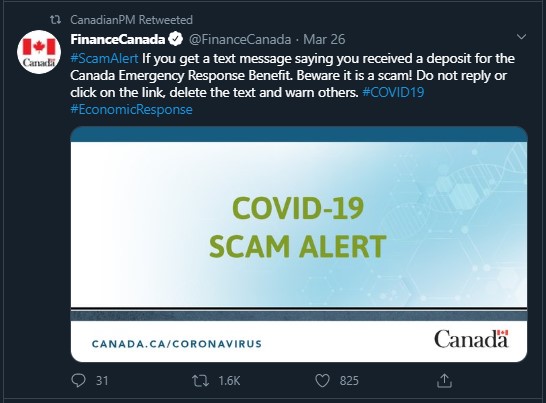File: 20-13075
Victoria, BC – Investigators are warning the public after several COVID-19 related fraud attempts have been reported in our community.
To date, these frauds fall into two main types; online frauds and a hybrid online/vacation rental fraud.
Online COVID-19 Frauds
These “phishing” model online frauds use the fear of COVID-19 related financial impacts to grab attention. These attacks then direct their potential victims to click on links that will compromise their personal and financial information.
On Thursday, March 26th, Finance Canada and the Prime Minister’s Office tweeted a scam alert about a text message that was circulating across the country. The text message claimed that the potential victim had received a deposit for the Canada Emergency Response Benefit. This text was a scam. Finance Canada has asked those who receive the text not to click the link, but to instead delete the text and warn others.
Additionally, email-based COVID-19 frauds are circulating in which scammers claim to be representatives of a major Canadian bank. The email asks potential victims to open an attached document which leads to malware and fraud risk. This email even purports to come from an actual representative from that financial service institution, who shows up in Google search results. This clever addition to this type of scam creates an undo sense of legitimacy. We ask those who received this email not to open the document, but instead to delete the email and warn others.
Hybrid online/vacation rental fraud
File: 20-13075
Patrol officers were called by an agent who rents AirBnB units yesterday to report an incident of a hybrid combination of online fraud and in-person theft. The agent reported that a renter had booked an AirBnB, but upon sign-in to the unit, had cancelled the booking, citing COVID-19. AirBnB currently offers full refunds for some bookings that cite COVID-19 as a reason for cancellation. The renter cancelled the booking, receiving a full refund for the unit, but then proceeded to stay in the unit anyway. When the agent went to check the unit, he discovered that in addition to fraudulently claiming a refund, the renter has stolen several items from the unit itself, including the television, stereo and toilet paper.
AirBnB operators are advised to ensure they are up to date with AirBnB’s policies. Please also review our recommendations on keeping your short-term vacation rental crime free.
This file is still under investigation.
Avoiding falling victim
One of the best ways to avoid falling victim to a fraud, particularly those which prey on COVID-19 related worries, is to connect, by telephone, email, text or other virtual means, with someone you trust to talk about the suspicious message. When you receive a text, email or other electronic message from someone you don’t know or that you weren’t expecting which asks you to visit a website, click on a link, or open a document – pause. Don’t open it until you’ve spoken with someone you trust about it.
When in doubt, don’t click.
For electronic messages that claim to come from a government agency, financial institution or other agency, contact the agency itself through the method with which you have contacted them in the past. For example, if you receive a text claiming to be from Revenue Canada, instead of replying to that text, look up the Revenue Canada contact number in your area and telephone them yourself directly.
For more information on how to avoid becoming a victim of fraud, please visit https://vicpd.ca/fraud.
If you have information about the AirBnB incident and have not yet spoken to investigators, you are asked to call our non-emergency line at (250) 995-7654. To report what you know anonymously, please call Greater Victoria Crime Stoppers at 1-800-222-8477.
-30-

